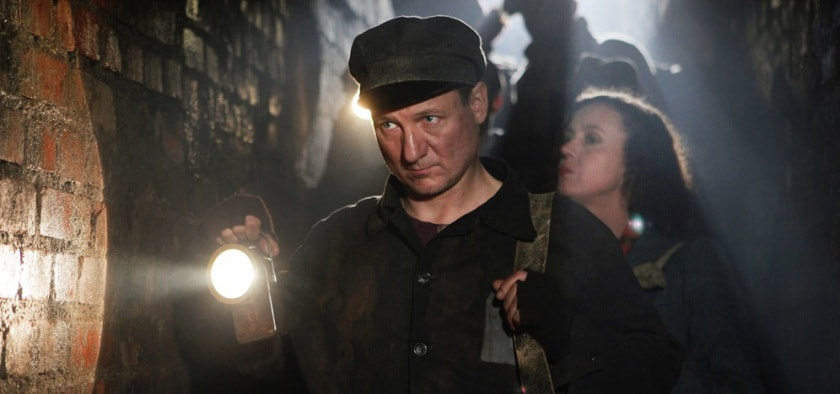In Darkness is a true Holocaust story that is about those that survived, but who and how many is unknown to the typical viewer. Maybe a couple of the sewer denizens makes it out, maybe they all do. The initial group of sewer denizens is quickly reduced when the initial space becomes untenable. Characters who we’ve become familiar with in the film’s first scenes are left to their own devices, leaving the possibility that anyone left can be killed or abandoned so that others might live. The film’s plot becomes a daily struggle to avoid detection and capture, but so much time goes by that sloppiness is guaranteed at some point. The lives onscreen become dictated by chance and randomness, where the difference between life and death is dependent on the weather or mood or a quick excuse that the hearer chooses to not follow up on, unless he does. Holland lingers on these turns of fate and cinematically contemplates how easily a situation can go in the best or worst direction, and her cast brilliantly conveys the same thought processes in agonizing real-time decision-making. Wieckiewicz in particular is given chance after chance to let his wheels visibly turn, such that the viewer can almost hear his inner monologue about if today’s the day he’s forced to doom people to their deaths.
The film also allows for how easy a decision like that would be to make. Setting aside the latent anti-Semitism in Polish society that the Nazi’s preyed upon, and the economic incentive for Leopold to sell them out, the Nazi’s heavy-handed retribution implicates Leopold’s entire family. When society crumbles, the circle of the valued that one has to redraw gets as tight as possible. Enlarging that circle, as Leopold does, is incredibly dangerous. On top of the moral calculus, the deadening effect of years of Nazi reign has cheapened life to nothing. An early scene of Leopold and Szczepek coming upon a nighttime firing squad executing dozens of screaming, naked women is followed by Leopold amorously climbing into bed with his game wife Wanda (Kinga Preis). This monumental horror is only one of many, and for Leopold, at least the women were Jews and not Poles. A theme of the film is resiliency, such that humans can get used to pretty much anything, whether it be the flood of rats in the sewer or bodies in the street. The one time Szczepek is truly shocked by something he sees in the sewer, Holland doesn’t show what he’s looking at. By that point, the viewer’s witnessed the horror that doesn’t move him; to see what does would be too much.
In Darkness becomes one of the better films depicting this historical period by getting at the base nature of humanity. The Nazi’s are mostly in the background, and their cruelty flows down the social pyramid they’ve constructed all the way to the bottom. The Jewish characters are no shrinking victims, but people who scratch and claw for whatever position and resources still exist for them. The Poles are generally fine with deadly attention turned away from them and towards a distrusted minority. The story of the Eastern front was frequently one of unleashing long held resentments and letting civilization crumble. Rebellion against such a devolution is not to engage in partisan warfare, which the Nazi’s and Soviets both obliquely wanted anyways for depopulation purposes, but to reject their premise entirely. There are no groups, there are no nationalities, there are only people. Solidarity would become a national rallying cry in Poland, and it was the antithesis of Nazi philosophy. In Darkness finds a story that transcends race and religion and nationality, and reduces human interaction to looking a fellow human in the face and saying, “If you won’t kill me, I won’t kill you.” That so many people choose to not abide by this during this time period makes the times when people did the opposite stand out so much more. A-

 RSS Feed
RSS Feed